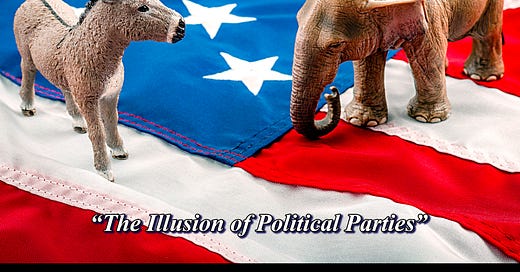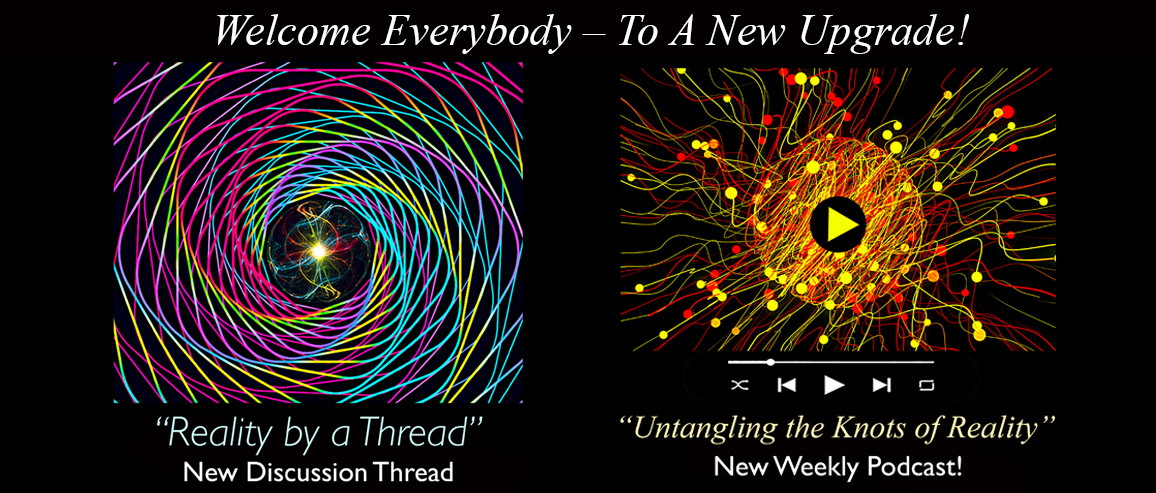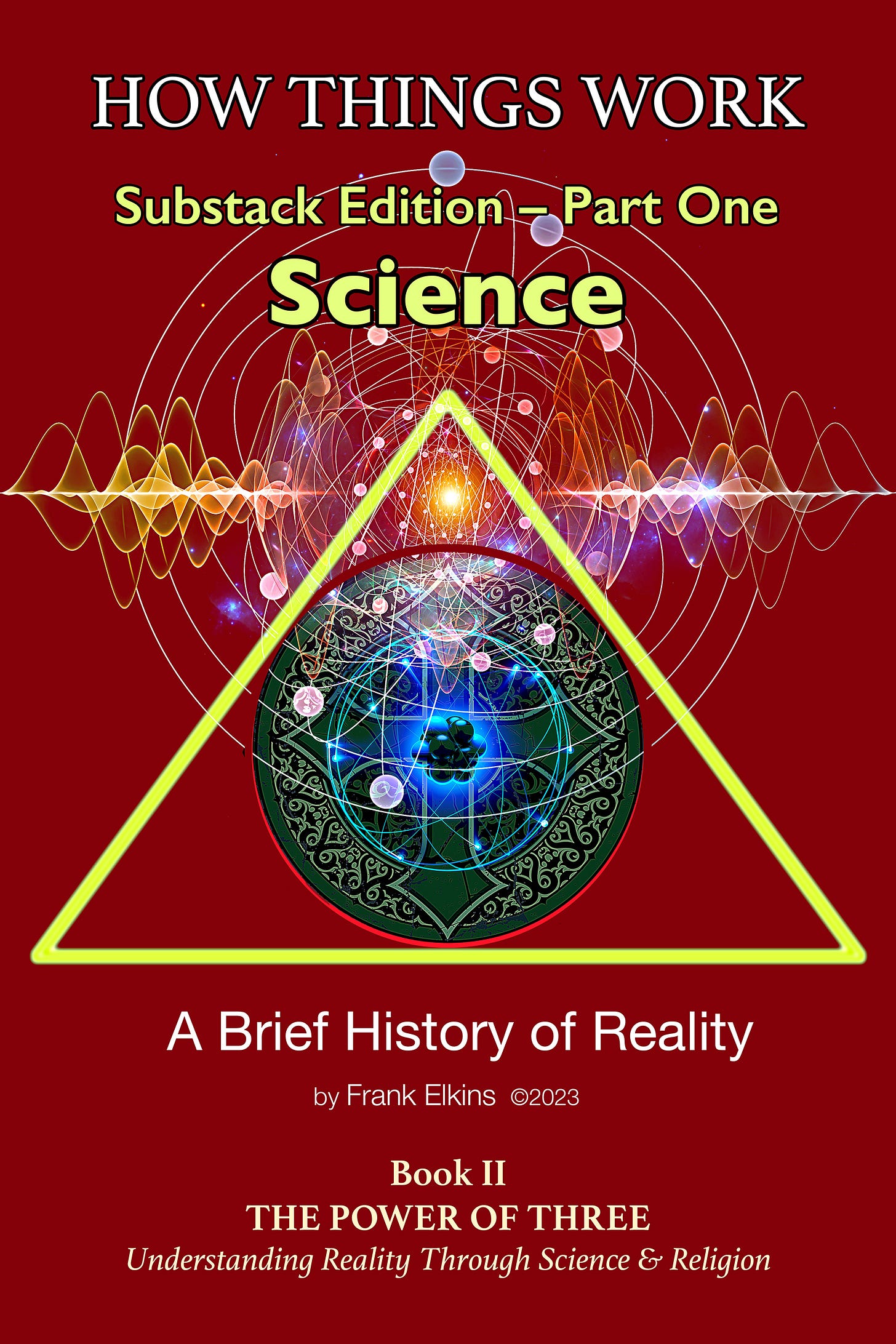How Things Work: A Brief History of Reality
SPECIAL EDITION: Consideration #114 – "The Illusion of Political Parties" (Excerpt from Book V - Quantum Consciousness)
Be A Part of the Conversation!
Tuesday December 19, 2023
“There is nothing which I dread so much as a division of the republic into two great parties, each arranged under its leader, and concerting measures in opposition to each other. This, in my humble apprehension, is to be dreaded as the greatest political evil under our Constitution.”
― John Adams
PREFACE
Welcome Everybody!
One of the main considerations of Book V, Quantum Consciousness, focuses on our current imbalance between Rationalism and Empiricism resulting in a breakdown in common Western dualities such as “being and non-being,” “science and religion,” and “conservative and liberal.” The “cause” of this imbalance is a result of science shifting from an empirical tool of investigation to a more rational tool of investigation; moving social consciousness, or Geist, in a more rational direction in opposition to “empirical reality.”
In this Special Edition Newsletter we will consider the nature of “political parties” in the United States not from the standpoint of which one is best or worst, but from a consideration of what they are and how they affect the political and social structure of the country. Our concern is not how these parties define political reality, but how they define empirical and rational reality. It is the beginning of understanding the current imbalance between rationalism and empiricism.
How do political parties influence our current duality?
CONSIDERATION #114 – The Illusion of Political Parties (Excerpt from Book V “Quantum Consciousness”)
“They [political parties] serve to organize faction, to give it an artificial and extraordinary force; to put, in the place of the delegated will of the nation the will of a party, often a small but artful and enterprising minority of the community; and, according to the alternate triumphs of different parties, to make the public administration the mirror of the ill-concerted and incongruous projects of faction, rather than the organ of consistent and wholesome plans digested by common counsels and modified by mutual interests.”
― George Washington
The original political structure of the United States was not based on “political parties.” The concept of political parties does not exist in the Declaration of Independence, the Constitution, or the Bill of Rights. However, the speeches and letters of the founders indicate that political parties were, in fact, a major concern, fearing they could “fracture” the new “enlightened” concept of government through the corruption of power.
“Washington believed, that above all else, this was the most dangerous challenge to the new Democratic Republic…”
George Washington specifically warned against a “two party” system that would devolve into two separate “power centers” competing for their own increase in power, as opposed to “objective empirical goals” that were beneficial for their constituents. Washington believed, that above all else, this was the most dangerous challenge to the new “Democratic Republic,” which was based on representative self-government.
However, almost immediately the inclination toward dualism led to the establishment of two parties. Regardless of the labels, the essence of these two parties reflected the difference between “Liberal” or “Progressive” ideas and concepts, as opposed to “Conservative” or “Orthodox” ideas and concepts.
After the Civil War, these two parties were labeled “Democrat” and “Republican.” Over time Democrats became identified with liberal, or progressive, ideas and Republicans became identified with conservative, or orthodox, ideas. Although an oversimplification, it represents a somewhat balanced approach for maintaining human reality.
“Conservatives are limit setters that keep Rationalists from destabilizing reality…”
Empiricists, or Conservatives, are focused on the essentials of maintaining an “empirical” existence. They are “limit setters” that keep Rationalists from “destabilizing” reality, or the empirical world, by keeping a focus on “what works” and has had a long history of having worked. They are reluctant to give up certainty and security for something uncertain and untested. Therefore, empirical concepts, such as law, order, and consistency, are important to their concept of a stable reality.
Conservatives tend to have a clear understanding that without “empirical limits” our “empirical reality” is impossible to manage and maintain in a “civilized” way. Thomas Hobbes serves as an example of this viewpoint.
“Progressives are trend setters that bring new ideas and concepts about reality into the human experience…”
Rationalists, or Progressives, are focused on the possibility of the future as opposed to the limitations of the past. They are “trend setters” that bring new ideas and concepts about reality into the human experience. However, they are also “disrupters” who challenge the orthodoxy of the past.
Sometimes these disruptions lead to a new paradigm of understanding, however, sometimes these disruptions lead to disaster; such as the French Revolution. Progressives tend to have a clear understanding that “empirical limits” must be overcome if we are to move into a “new” future paradigm shift. How Things Work is a matter of evolution toward perfection, not certain intractable truths. John Locke traditionally reflects this "Liberal" point of view.
“…unlike other dualities, all human beings reflect a balance of Rationalism and Empiricism.”
However, unlike other dualities, all human beings reflect a balance of Rationalism and Empiricism. A human being functioning only at the “empirical” level of experience is not a human being; they are like any other animal. A human being functioning at a purely “rational” level of experience cannot function in the empirical world; they would exist only in a pure state of mind such as a dream.
Human beings represent a blend and balance of Rationalism and Empiricism; this blend is the essence of the human experience of reality. How does this relate to the concept of political parties?
POSTSCRIPT
“There are many men of principle in both parties in America, but there is no party of principle.”
― Alexis de Tocqueville
If our experience of reality is truly a balance of Rationalism and Empiricism, we need a balance of Conservatism and Liberalism to maintain stability, and to develop and grow into the future. Eliminating one or the other will not solve our modern dilemma. If we cannot look past the self-limiting labels of political parties and consider our critical questions and concerns from the standpoint of balancing Rationalism and Empiricism, we are destined to devolve into a state of disunity and chaos.
“Without Conservatism societies do not last, however, without Liberalism societies do not grow and evolve.”
However, there is also an opportunity for moving beyond the limited, incongruent dualism of political parties, for a consideration regarding the nature of our reality in a more critical and profound way. Without Conservatism societies do not last, however, without Liberalism societies do not grow and evolve. We need to focus on balancing rational possibility and potential with current empirical reality.
No one needs to change their political views or political party; however, everyone should occasionally question their political views and their political party in addition to considering what the other party has to say. Not based on political partisanship; but based on a balance between Rationalism and Empiricism.
Next week, something special…
POST POSTSCRIPT
Merry Christmas & Happy Holidays Everybody!
This Week on “The Thread”…
Excerpt From This Week’s Year End Review Podcast…
Expand the Conversation by Upgrading to “Reality by a Thread!”
•UNTANGLING THE KNOTS OF REALITY: Year in Review Special Podcast Part-3 “Untangling Adam Smith and Capitalism” – Podcasts #44-#48
(The third part in our review and synopsis of this year’s podcasts include “Life Before Capitalism,” “Classic Economic Theory,” “The Laws of Economics,” “The Results of Capitalism,” and more…)
• REALITY BY A THREAD: The Time-Gravity Enigma – “Perhaps the best analogy for time is gravity. Gravity is an enigma that, in one sense or another, has always been considered an integral part of empirical reality. Newton established the mathematical foundation behind the concept of gravity. However, he had no idea what gravity actually was or how it worked. Likewise, the enigma of time has always been recognized as an integral part of empirical reality. Einstein understood its relativity, however, even he did not understand what it was or how it actually worked. What, exactly, is time?”
•FREE PDF Downloads of Book IV: “The Cosmic Symphony – Overtones of String Theory” plus other Free Books, Discounts and Benefits. Also Gain Complete Access to all Previous Podcasts and Threads!








